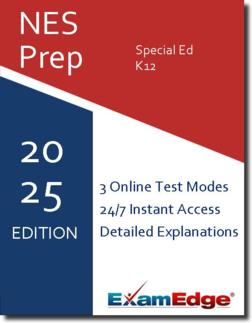NES Special Ed K12 (601) Practice Tests & Test Prep by Exam Edge - Topics
Based on 20 Reviews
- Real Exam Simulation: Timed questions and matching content build comfort for your NES Special Ed K12 test day.
- Instant, 24/7 Access: Web-based NES Special Education K-12 practice exams with no software needed.
- Clear Explanations: Step-by-step answers and explanations for your NES exam to strengthen understanding.
- Boosted Confidence: Reduces anxiety and improves test-taking skills to ace your NES Special Education K-12 (601).

Understanding the exact breakdown of the NES Special Education K-12 test will help you know what to expect and how to most effectively prepare. The NES Special Education K-12 has multiple-choice questions The exam will be broken down into the sections below:
| NES Special Education K-12 Exam Blueprint | ||
|---|---|---|
| Domain Name | % | Number of Questions |
| Students with Disabilities | 20% | 30 |
| Assessment and Program Planning | 20% | 30 |
| Learning Environments and Instructional Practices | 40% | 60 |
| Foundations and Professional Practice | 20% | 30 |


